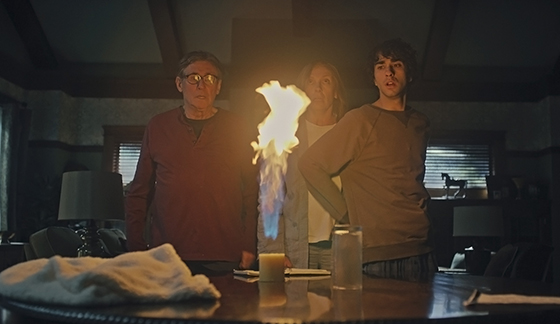Hereditary
Written and directed by Ari Aster, HEREDITARY is both a commentary on death and grief as well as a critique of inherited affluence and the lengths…

Gabriel Byrne, Toni Collette , and Alex Wolff. Photo courtesy of A24.
Written and directed by Ari Aster, HEREDITARY is both a commentary on death and grief as well as a critique of inherited affluence and the lengths families go to at the expense of others to acquire and preserve it.
Toni Collette, Gabriel Byrne and Alex Wolff star as, respectively, Annie, Steve, Peter Graham, in this terrifying—if trope-filled—film. But the standout is Milly Shapiro as Charlie, a child whose disquieting manner forewarns of a deeper disturbance brewing since the passing of the Grahams’ matriarch. Barely fifteen (portraying a thirteen year-old), and in her first feature, Shapiro’s transformation into the accursed Charlie stands alongside ensemble of seasoned performers, including Alex Wolff who won several critics awards for his performance in COMING THROUGH THE RYE.
In addition to a narrative twist I won’t spoil, the cast largely elevates HEREDITARY from contemporary pablum to classical horror in the style of Argento’s SUSPIRIA. Collette in particular deserves at least a few award nominations for three scenes that demonstrate her range from the subtle to the extreme—spanning the emotional gamut.
Let’s talk about contemporary horror for a minute. This year’s A QUIET PLACE has all the same moving pieces yet takes the slow disintegration of the family unit in the direction of a creature feature riddled with plot holes. Far more disturbing was Jennifer Kent’s THE BABADOOK. An indepedent Australian project, it used its creeping, behatted bogeyman as a metaphor for postpartum depression.
In HEREDITARY, clever use of lighting, perspective and depth immediately create a sense of unease in the Graham household. A smart person (or anyone who saw the PUPPET MASTER films) might get rid of the eerie figurines inhabiting Annie’s affectatious dioramas—in another life she was Delia Deetz. It soon becomes clear, however, that the household is under another kind of spell, and not the Harry Belafonte variety.
Suddenly, a tragedy befalls the Grahams, propelling Annie from melancholy into a kind of grief that teeters on the edge of what appears to be mental illness—hence the title. As the saying goes, “It’s not paranoia if it’s real.” And this is only the end of the first act. Most horror films have a threshold to artificially ground an otherwise supernatural plot in some kind of relatable reality—nobody can see the evil except the “crazy” person. HEREDITARY toes the line for the first two acts, then sprints past it. As William Shakespeare once wrote: What’s past is prologue… What follows is totally bat-shit.
Aster’s use of tropes—a disfigured child, spooky things in the shadows, jump scares, something rotting in the attic—are all distractions to lull us into a familiar routine so we never see the real evil around the corner… or, rather, in the treehouse. Nothing I describe can prepare you for it. It’s not the gore that’s terrifying. It’s the entire visual composition and its unspeakable, immeasurable portents.
The real horror in HEREDITARY manifests as grief and dissociation. Like THE BABADOOK, the film examines how grief clouds judgment and renders us susceptible to manipulation by those who would abuse it for material gain. In that regard, it is the oldest and yet most opportune of narratives.
BONUS: The most marvelously insane ending, punctuated by Colin Stetson’s adaptation of Wagner’s Vorspiel.